- Home
- Peter Ackroyd
Rebellion: The History of England from James I to the Glorious Revolution Page 2
Rebellion: The History of England from James I to the Glorious Revolution Read online
Page 2
* * *
On his progress to London from Edinburgh, at the beginning of his reign, the king was given a petition; it was an appeal from his puritan subjects that became known as the ‘millenary petition’, bearing the signatures of 1,000 ministers of religion. In moderate terms it suggested to the king that the sign of the cross should be removed from the baptismal ceremony and that the marriage ring was unnecessary. The words ‘priest’ and ‘absolution’ should be ‘corrected’, and the rite of confirmation abolished. The cap and the surplice, the vestments of conformity, were not to be ‘urged’.
The king himself liked nothing so much as doctrinal discussion, in which he could display his learning. The first important act of his reign, therefore, was to bring together a small number of clerics at his palace of Hampton Court where they might debate matters of religious policy and religious principle. Five distinguished and learned puritan ministers were matched against the leading ecclesiastics of the realm, among them the archbishop of Canterbury and eight bishops.
This was an age of religious polemic, perhaps prophesying the civil wars of the succeeding reign. On the side of the bishops were those generally satisfied with the doctrines and ceremonies of the established Church; they were moderate; they espoused the union of Church and state. They put more trust in communal worship than in private prayer; they acknowledged the role of custom, experience and reason in spiritual matters. It may not have been a fully formed faith, but it served to bind together those of unclear or flexible belief. It also suited those who simply wished to conform with their neighbours.
On the side of the puritans were those more concerned with the exigencies of the private conscience. They believed in the natural depravity of man, unless the sinner be redeemed by grace. They abhorred the practice of confession and encouraged intensive self-examination as well as self-discipline. They did not wish for a sacramental priesthood but a preaching ministry; they accepted the word of Scripture as the source of all divine truth. They took their compass from the stirrings of providence. Men and women of a puritan tradition were utterly obedient to God’s absolute will from which no ritual or sacrament could avert them. This lent them zeal and energy in their attempt to purify the world or, as one puritan theologian put it, ‘a holy violence in the performing of all duties’. Sometimes they spoke out as the spirit moved them. It was said, unfairly, that they loved God with all their soul and hated their neighbour with all their heart.
They were not at this stage, however, rival creeds; they are perhaps better regarded as opposing tendencies within the same Church, and their first formal confrontation took place at Hampton Court in the middle of winter. The proceedings of the first day, 14 January 1604, were confined to the king and his ecclesiastics. James debated with his bishops the changes suggested in the ‘millenary petition’. On the second day the puritan divines were invited to attend. John Reynolds, the first to be called, argued that the English Church should embrace Calvinist doctrine. The bishop of London, Richard Bancroft, quickly intervened. He knelt down before the king and demanded that ‘the ancient canon might be remembered’, by which he meant that ‘schismatici’ should not be permitted to speak against the bishops. James allowed the discussion on specific matters to continue.
In the subsequent debate the king seems to have been shrewd and judicious. He did not accede to the puritans’ demand for Calvinism, but he did accept their proposal for an improved translation of the Bible. This request bore magnificent fruit in the King James translation published later in the reign. The delegates then discussed the problem of providing a learned ministry, and the difficulties of dealing with issues of private conscience. The king was willing to concede certain matters to the puritans, in the evident belief that a middle way would encourage unity within the Church. In the bitter weather the fires of Hampton Court roared, while the king sat in his furs; the bishops, and even the puritan delegates, were also clad in fur cloaks.
All seemed to be proceeding without much incident until Reynolds recommended that the bishops of the realm should consult with the ‘presbyters’. At this, the king bridled. ‘Presbyter’, the term for the elder or minister of a Christian church, had for him unfortunate connotations. He had previously been outraged by the Presbyterian divines of Scotland, who did not always treat His Majesty with appropriate respect; they inclined towards republicanism and even egalitarianism. One of them, Andrew Melville, had called him to his face ‘God’s silly vassal’.
James now told Reynolds and his colleagues that they seemed to be aiming ‘at a Scottish Presbytery which agreeth with monarchy as well as God and the devil’. He added that it would mean ‘Jack and Tom, and Will and Dick, shall meet, and at their pleasure censure me and my council and all our proceedings’. He concluded with advice to Reynolds that ‘until you find that I grow lazy, leave it alone’. His motto from this time forward would be ‘no bishop, no king’. He observed, as the puritan delegates left his presence, that ‘if this be all they have to say, I shall make them conform themselves, or I will harry them out of the land, or else do worse’.
Two days later the king summoned the bishops for a further conference. He then called back the puritans, and ordered them to conform to the whole of the orthodox Book of Common Prayer reissued forty-five years before. The conference was over. The impending translation was the greatest benefit of the proceedings but, altogether, the conference cannot be counted a great success. It had now emerged that there was perhaps not one national Church, after all, but at least two Churches with different meanings and purposes.
The king was, as ever, delighted with his performance at Hampton Court. ‘I peppered them soundly,’ he said. The bishops had told him that he had spoken with the power of inspiration. ‘I know not what they mean,’ Sir John Harington wrote to his wife, ‘but the spirit was rather foul-mouthed.’ The king had said, at one point, ‘A turd for this argument. I would rather my child were baptized by an ape as by a woman.’ He also chastised the puritans by remonstrating ‘Away with your snivelling!’
He was, however, in many respects a learned man. All his life he had argued, and debated, with his Scottish clergy. He delighted in theological controversy, and according to an early observer ‘he apprehends clearly, judges wisely and has a retentive memory’. The king also believed himself to be a master of the written word and composed volumes on demonology, monarchy, witchcraft and smoking. On his accession medal he is crowned with a laurel wreath, a sure sign of his literary pretensions. He even replied to ‘rayling rhymes’ published against him with his own doggerel verse. In 1616 he collected all of his prose writings into a folio volume, the first English monarch ever to do so. So he became known, sometimes sarcastically, as ‘the British Solomon’.
John Whitgift, archbishop of Canterbury, now close to death, realized that the conclusion of the Hampton Court conference was by no means the end of religious controversy. He knew well enough that parliament, about to meet, contained many lords and gentlemen of a puritan persuasion. The king had decided to ride in state through the capital four days before the opening of parliament on 19 March 1604. Now that the threat of plague had lifted it was declared that people from every ‘county, borough, precinct, city, hamlet’ had flocked to give praise to the new monarch. Seven triumphal arches, in the style of imperial Rome, were erected along the processional route from the Tower to Whitehall. Yet magnificence did not necessarily command assent.
It was a large parliament, eager to take the measure of James I. In his opening speech the king made some remarks upon the state of religion and admonished the puritans for ‘being ever discontented with the present government’. When it became clear that the Commons were more concerned with various matters of privilege and grievance, James rebuked them ‘as a father to his children’. Further causes of contention soon emerged.
A dispute had arisen over the election of a member for Buckinghamshire and the ensuing argument pitched king against parliament. On 5 April the Speaker delivered a m
essage from James that he desired ‘as an absolute king’ that there might be a conference between the Commons and the judges. No monarch had spoken to parliament in that manner for years. Silence and amazement followed this peremptory request, whereupon one member stood up and said that ‘the prince’s command is like a thunderbolt; his command upon our allegiance like the roaring of a lion; to his command there is no contradiction’.
That was not necessarily the case. In the middle of April it was proposed that James should assume the title of king of Great Britain, with the union of his kingdoms; it might have been deemed a mere formality under the circumstances. But the Commons were not so easily to be persuaded. What kind of union was being proposed? Economic? Constitutional? By what laws will this ‘Britain’ be governed? There might be a flood of Scots taking up all posts and honours. How could the common law of England be consistent with the legal traditions of Scotland or even with the customs of Ireland?
The king himself was adamant. ‘I am the husband,’ he said, ‘and all the whole isle is my lawful wife; I am the head and it is my body.’ Did they wish him to be a polygamist with two separate wives? The debate lingered into the succeeding year with what the king called ‘many crossings, long disputations, strange questions, and nothing done’. He had a vision of a united kingdom with one law, one language and one faith; yet the practicalities of the period rendered the ambition useless. The English demanded, for example, that the Scots be taxed at the same rate as themselves; the Scots demurred, pleading poverty. The Commons had already agreed that since ‘we cannot make any laws to bind Britannia … let us proceed with a leaden foot’. The king’s enthusiasm for the project was as great as his anger against the opponents of union.
Parliament then turned its attention to matters of religion, and in particular to the work of the Hampton Court conference. It was here, as we have seen, that Archbishop Whitgift sensed trouble from the great puritan gentry who had already taken their seats. By the end of May the Commons had brought in two bills, one of which was directed against pluralists and non-residents; these men, who held more than one clerical living or were keen to relegate their duties, included some of the most prominent members of the established Church. The bias of the Commons was clear enough. The second bill expressed the desire for ‘a learned and godly ministry’, a request tantamount to a demand for puritanism.
The king was vexed, and by way of justification a parliamentary committee drew up a ‘form of apology and satisfaction’, read to the Commons on 20 June, in which were defended such rights as freedom of speech and freedom from arrest. It was declared that ‘our privileges and liberties are our true right and due inheritance, no less than our lands and goods’. It was a parliamentary way, perhaps, of introducing a Scottish king to the peculiar constitution of England. Another section stated that ‘your majesty should be misinformed if any man should deliver that the kings of England have any absolute power in themselves either to alter religion … or to make any laws covering the same’. The ‘form of apology’ was never presented to the king; it may have been rejected by a majority as too extreme.
Without doubt, however, James came to hear of it; he resented its implication and was angered at its impudence. He came down to prorogue parliament on 7 July, where in the course of his speech he berated some of its members for being ‘idle heads, some rash, some busy informers’. He said that in Scotland he was heard with respect whereas here there was ‘nothing but curiosity from morning to evening to find fault with my propositions’. In Scotland ‘all things warranted that came from me. Here all things suspected.’ He added that ‘you have done many things rashly, I say not you meant disloyally’. Then, at the conclusion, he advised that ‘only I wish you had kept a better form. I like form as much as matter.’
He was perhaps waiting for the assistance of Richard Bancroft, newly installed as archbishop of Canterbury, who was a firm upholder of the royal prerogative and no lover of puritans. Even then Bancroft was steering the convocation of senior clergy towards a statement of general religious conformity; the canons of 1604 gave nothing to the puritans but demanded that they submit to the Book of Common Prayer and to the Thirty-Nine Articles. The sectarian ministers must conform or be deprived. The more draconian penalties were in truth rarely applied, but the measures marked the first schism in the history of the reformed English Church.
So the king had prorogued parliament with a very bad grace, little or nothing having been achieved by it. He stated at a later date that it was a body without a head. ‘At their meetings,’ he is reported to have said, ‘nothing is heard but cries, shouts and confusion. I am surprised that my ancestors should ever have allowed such an institution to come into existence.’ His opinion may have been shared by others. In the winter of 1604 Thomas Percy sub-leased a house beside the Palace of Westminster and, with the assistance of Guy Fawkes and other conspirators, began to excavate a tunnel.
2
The plot
In these early years the king was proclaimed as a Caesar, a David, a Noah, a Joash and even a Homer. He was a second Augustus, a true Josiah, a wise and religious sovereign. It is difficult to know what this bewildering wealth of parallels might signify, but one virtue soon became predominant. He was ‘rex pacificus’ or ‘Jacobus pacificus’. Blessed was the peacemaker. His was the reign of the fig tree and the vine.
Others were not so satisfied by the pleasures of peace. ‘Na, na,’ James is supposed to have said after his coronation, ‘we’ll not need papists now.’ He had wooed them in case of trouble, but could now afford to discard them. In February 1604, the Jesuit priests who owed all their obedience to Rome were banished from the realm. It was a sensible precaution, perhaps, but for fervent Catholics it was an ominous sign.
Among these was Thomas Winter, or Wintour, who had unsuccessfully appealed to Philip III of Spain for aid on behalf of the faithful. In the same month of February 1604, he visited his cousin, Robert Catesby, at Lambeth. Catesby was possibly a convert from Protestantism and therefore one in whom the Roman fire burned ever more brightly. It was he, rather than Guy Fawkes, who led what became known as the ‘powder plot’. Catesby informed his cousin of his grand plan to blow up parliament with gunpowder, but of course he needed allies in the work. In April Winter travelled to Flanders from which place he brought back Fawkes himself. We may now refer to them as conspirators. ‘Shall we always, gentlemen, talk,’ Thomas Percy said, ‘and never do anything?’ In the following month an oath of secrecy was sworn before they made their way to a house behind the church of St Clement Eastcheap, where they met a Jesuit by the name of Gerard who administered to them the Holy Sacrament.
It was now agreed that a dwelling conveniently close to parliament must be found, but it was not until the beginning of December that a suitable property became available. On the 11th of the month they entered the house, carrying with them a stock of hard-boiled eggs and baked meats. By Christmas Eve the conspirators had dug their way down and, in the words of Thomas Winter, ‘wrought under a little entry to the wall of the parliament house and underpropped it as we went with wood’. They believed that the next session would begin in February 1605, but now they learned that it was prorogued until the following October. They had more time. The gunpowder was being stored at Catesby’s lodgings in Lambeth but, under conditions of great secrecy and security, it was brought to the house at Westminster. They had already made some progress in penetrating the 9-foot wall, but their work was impeded by the influx of water.
One day, soon after the gunpowder had been acquired, they heard a rustling sound above their heads. Fawkes went out of doors and cautiously investigated. He was met by Ellen Bright, coal merchant, who informed him that she was leaving the premises; it so happened that her cellar or vault ran under the parliament house itself. The deal was quickly settled; Thomas Percy, another conspirator, secured the lease of the space. An iron gate between the basement of the conspirators’ house and Mrs Bright’s cellar was opened, and Fawkes was able to
smuggle some thirty-six barrels of gunpowder into the neighbouring vault. There was enough powder to destroy many thousands of people.
By September fresh barrels of gunpowder were acquired in order to replace those affected by damp. Funds were running low, however, and it was deemed advisable to bring in three other conspirators with money or property. Thirteen men were by this time apprised of the secret, leaving thirteen ways for the secret to be betrayed. One of the newly recruited conspirators, Francis Tresham, pleaded strongly that his brother-in-law, Lord Monteagle, should be spared the general conflagration. Monteagle was a staunch Catholic who had already defended his Church in the House of Lords. The others demurred at the exception, however well meant. Monteagle was sitting down for dinner on 26 October, at his house in Hoxton, when a letter was brought to him by a messenger. He glanced at it and then requested one of his gentlemen to read it aloud.
‘My lord, out of the love I bear to some of your friends, I have a care of your preservation. Therefore I would advise you, as you tender your life, to devise some excuse to shift of your attendance at this parliament…’ So it began. The correspondent then went on to warn that ‘they shall receive a terrible blow this Parliament, and yet they shall not see who hurts them’. Monteagle immediately set out for Whitehall with the letter in his hand. He came upon Robert Cecil, now the newly created earl of Salisbury, sitting down to supper with some other members of the privy council.
Monteagle took Salisbury into an adjoining room, and showed him the document. Salisbury was at first inclined to dismiss the matter as a false alarm but, on his consulting his colleagues, the possibility of gunpowder as a ‘terrible blow’ was discussed. The lord chamberlain, the earl of Suffolk, knew intimately the interior of parliament; in particular he was aware of the damp and capacious cellars beneath the building. He, and other privy councillors, agreed that they should be searched before the beginning of the session that had been further postponed to 5 November; but they did not wish to act too precipitately for fear of scaring away the plotters.

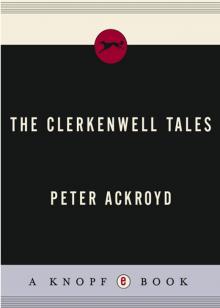 The Clerkenwell Tales
The Clerkenwell Tales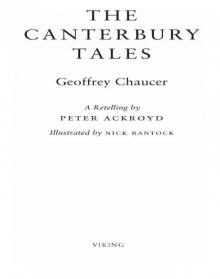 The Canterbury Tales
The Canterbury Tales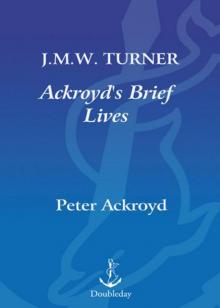 J. M. W. Turner
J. M. W. Turner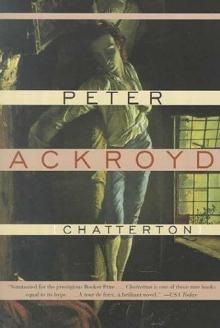 Chatterton
Chatterton The Canterbury Tales – A Retelling
The Canterbury Tales – A Retelling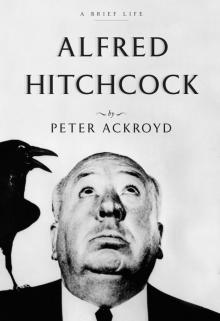 Alfred Hitchcock
Alfred Hitchcock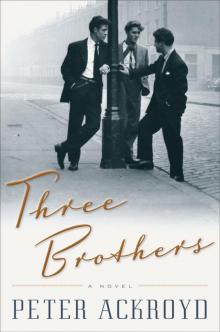 Three Brothers
Three Brothers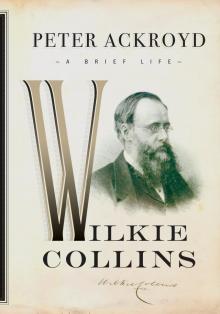 Wilkie Collins
Wilkie Collins Venice
Venice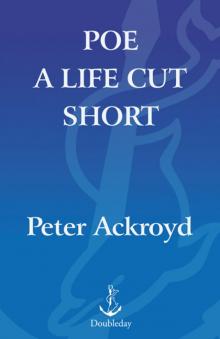 Poe
Poe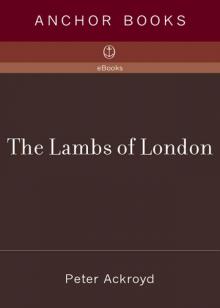 The Lambs of London
The Lambs of London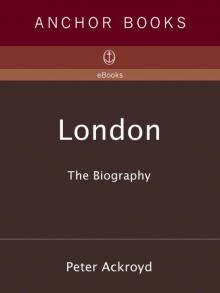 London
London Queer City
Queer City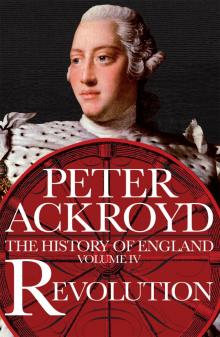 Revolution, a History of England, Volume 4
Revolution, a History of England, Volume 4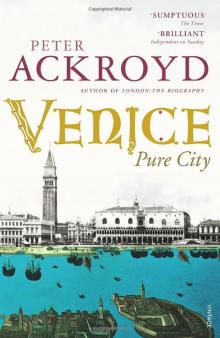 Venice: Pure City
Venice: Pure City Foundation
Foundation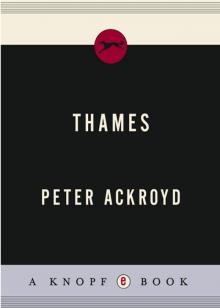 Thames
Thames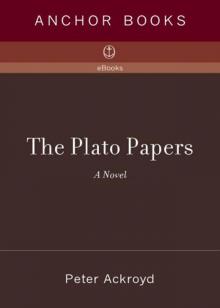 The Plato Papers
The Plato Papers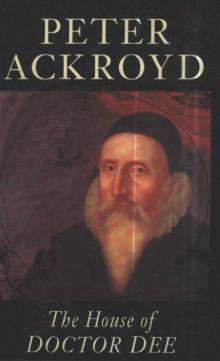 The house of Doctor Dee
The house of Doctor Dee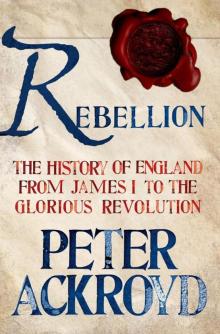 Rebellion: The History of England from James I to the Glorious Revolution
Rebellion: The History of England from James I to the Glorious Revolution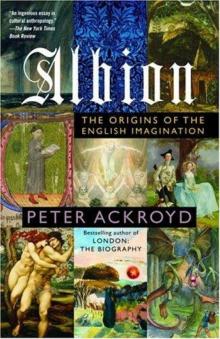 Albion: The Origins of the English Imagination
Albion: The Origins of the English Imagination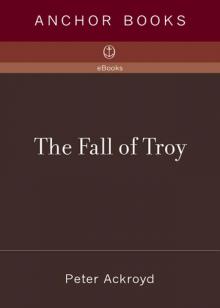 The Fall of Troy
The Fall of Troy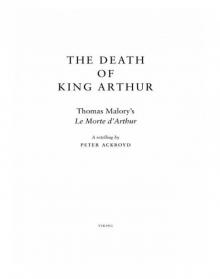 The Death of King Arthur
The Death of King Arthur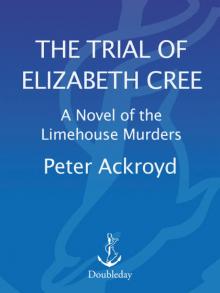 The Trial of Elizabeth Cree
The Trial of Elizabeth Cree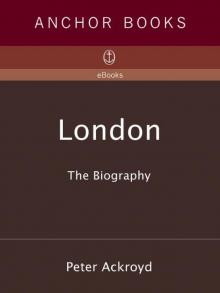 London: The Biography
London: The Biography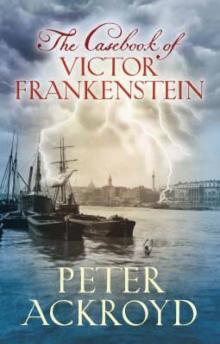 The Casebook of Victor Frankenstein
The Casebook of Victor Frankenstein Hawksmoor
Hawksmoor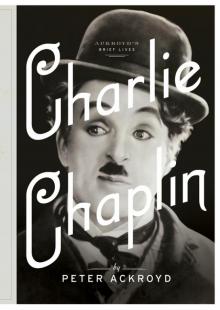 Charlie Chaplin
Charlie Chaplin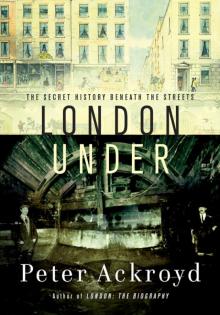 London Under
London Under